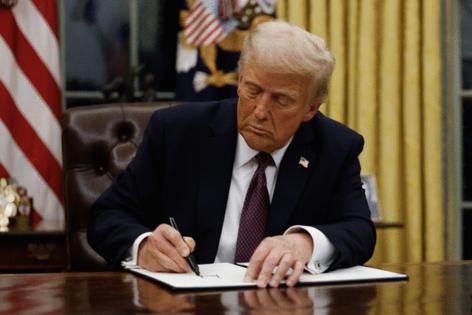Trump imposes tariffs, sanctions on Colombia in migrant fight
Published in News & Features
President Donald Trump imposed tariffs and sanctions on Colombia hours after its leftist president refused to allow two military planes carrying deported migrants to land, punishing a U.S. ally for stepping even partially out of line with his immigration goals.
In a social media post Sunday, Trump said he ordered an emergency 25% tariff on all Colombian goods coming into the U.S., which will be raised to 50% in a week. Oil, gold, coffee and flowers top the list of exports, according to Colombia’s tax authorities.
Trump’s action upended decades of warm relations between the two countries and may be devastating to the Andean nation’s fragile economy. Relations between Trump and Colombian President Gustavo Petro had been widely expected to be strained, though the deterioration was swifter and more damaging than almost anyone anticipated.
“Petro’s denial of these flights has jeopardized the National Security and Public Safety of the United States,” Trump said in his post.
Petro responded less than three hours after Trump’s post that he had ordered retaliatory tariffs of 25% on US imports. The Colombian government will help with the process of replacing more expensive U.S. imports with domestic production, he said in a post on X, without elaborating.
Trump’s reaction shows how he sees tariffs as an economic weapon to be deployed against governments that may challenge his geopolitical goals. It sends a powerful message to the world that not even old political allies are safe if they do not cooperate with him.
The actions were taken in response to two flights carrying a total of 160 people, part of a group of 350 Colombians scheduled for deportation, a person familiar with the situation said.
Petro initially welcomed the flights but changed his mind when it became clear the U.S. was sending the migrants on military planes. Mexico canceled a flight of deportees before it took off, saying in advance that it would not allow a military plane to land, the person said.
Latin American officials, including Petro, have also said they were dismayed by the migrants arriving in leg shackles and handcuffs. The U.S. and El Salvador are working on an asylum agreement that would allow U.S. officials to deport non-Salvadoran migrants to the Central American nation.
In a statement on Sunday, Colombia said it would offer the presidential plane to ferry migrants back. And Petro’s recently appointed Foreign Affairs Minister, Laura Sarabia, said that Colombia was open to talks with the US.
Colombian-U.S. trade
While most South American nations now do more business with China, the U.S. remains Colombia’s top trading partner.
Between January and November 2024, Colombian exports to the U.S. reached $13 billion, a near 8% increase compared to the same period in 2023. Colombians in the U.S. also generate strong cultural ties and remittance flows.
Colombia is the U.S.'s fourth-biggest source of foreign oil, topping both Saudi Arabia and Brazil, according to the Energy Information Administration. The latest data showed Colombia shipping more than 215,000 barrels of crude daily to US ports.
About a third, or 29%, of Colombian exports go to the U.S.
Trump also called for a travel ban and immediate visa revocations on Colombian government officials “and all Allies and Supporters” as well as visa sanctions on party members, family members and supporters of Petro’s government. The U.S. Embassy’s visa section will close on Monday, potentially canceling hundreds of appointments, the person familiar said.
Trump also said in his post that he would enhance customs inspections of all Colombian nationals and cargo on national security grounds. He added that under his executive authority, Treasury, banking and financial sanctions will be fully imposed.
Trump delivered a fresh threat upon taking office to place tariffs on Canada, Mexico and China on Feb. 1, which he said would balance trade deals and collect revenue to offset his domestic legislative proposals. While on the campaign trail, he considered creating a universal baseline tariff as a way to incentivize manufacturing and business in the United States.
Colombia has historically been one of Washington’s biggest allies in Latin America and a major recipient of U.S. aid and military assistance. Yet as one of the region’s leading leftist leaders, Petro was already on the wrong side of Trump. Petro has courted China and slammed Israel over the death toll among Palestinians in its war with Hamas.
“Petro’s response to Trump was foolish and it was a fight he won’t win,” Sergio Guzmán, an analyst at Colombia Risk Analysis said. “Social media posts have consequences, and it will be a difficult moment for Colombia as it will have real repercussions on us.”
“It couldn’t come at a worst moment for the Colombian flower industry,” he said, given Valentine’s Day is approaching.
The two countries’ ties were already at risk after last week, when guerrillas from the Marxist ELN group went door to door with death lists in a bid to seize total control of Catatumbo, a mountainous cocaine-producing region near the Venezuelan border.
As a result, Colombia could potentially face decertification as a partner in the war on drugs, putting it in the same rogue category as Nicolás Maduro’s Venezuela — even if the effect would be more reputational than financial.
The White House has said that it has arrested 538 illegal immigrants and had begun using military aircrafts to remove them within the administration’s first 100 hours.
_____
(With assistance from Joe Carroll, Walter Brandimarte and Oscar Medina.)
_____
©2025 Bloomberg L.P. Visit bloomberg.com. Distributed by Tribune Content Agency, LLC.







Comments